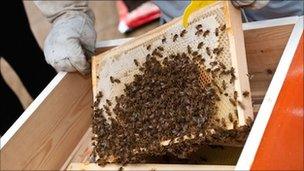London bee numbers 'could be too high'
- Published

Inmidtown said its scheme had led to a 40% increase in honey produced
There may be too many bees in the capital, the London Beekeepers Association (LBKA) has said.
The association has criticised an initiative by a business group offering hives to central London firms.
InMidtown, which represents firms in Holborn, Bloomsbury and St Giles, said its scheme had seen a 40% increase in honey produced in the last year.
But the LBKA dismissed the project as "bee bling" saying firms should focus their spending on planting forage.
LBKA secretary Angela Woods said: "There are a finite number of green spaces in London. It could get to the point where the bees are not sustainable.
"London's bee population is going up but honey yields in London are going down and we need to ask is it because there is not enough forage."
InMidtown said it had doubled its bee hives from four to eight, introduced more plants and increased its honey produced to 37lbs (16.8kg), bucking the national trend.
'Bee bling'
The total honey crop for England and Wales is estimated to be down 50% on an average year, which equates to a loss of £7m for UK honey production, according to a recent survey carried out by the Bee Farmers' Association (BFA).
London Wildlife Trust reserves manager Tom Hayward, said: "We are really encouraged by InMidtown's commitment to help 30 businesses in their district of London to install bee hives and to plant pollinator friendly plants. "
But LBKA said latest government figures showed the number of officially registered bee colonies in the capital had increase from 1,617 in 2008 to 3,337 in 2012.
Ms Woods said: "We may have too many bees in London.
"We are consulting environmental organisations and academics to look at ways to get credible data to find out what's really happening.
"Firms would be better off spending money on forage projects and teaching bee keepers to act responsibly."
An InMidtown spokesman said: "Our team that led this scheme has been trained and guided by sustainability experts to ensure the flower to bee ratio is right before any hives are installed.
"We are very happy with how this scheme is being managed and the interest from businesses in the district to participate this year."
- Published19 August 2011
- Published13 June 2011